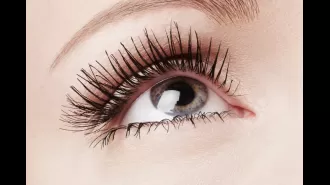Sleep abuse is a type of control that is not commonly discussed.
Experts say abusers use a subtle tactic that even victims may not recognize as abuse.
September 24th 2024.

It took Christina a long time to come to the realization that she was in an abusive relationship. Despite being with her ex-husband for 13 years, his physical violence only surfaced towards the end of their marriage. Christina reflects, "I didn't have any visible bruises or injuries, so it was difficult for me to see the signs. His way of controlling me was by manipulating my thoughts and mind."
Christina was in her mid-30s when she married her ex-husband, who would eventually become her tormentor. She already had two children from a previous marriage and they had two more together. However, soon after the birth of their first child, Christina's ex-husband began to implement subtle and insidious patterns of abuse, taking advantage of her vulnerability.
One of the main ways Christina's ex-husband exerted control over her was by depriving her of sleep and draining her both physically and mentally. Late at night, when the children were asleep and Christina was about to drift off, her ex-husband would pick fights with her. These arguments usually revolved around their parenting styles, as he became increasingly overprotective of their children and would often blame her older kids for any issues.
Christina recalls, "I would go to bed, and he would just start. He wouldn't be yelling or shouting, but he would repeat his opinions over and over again, trying to prove that he was right and I was wrong." These circular arguments could last for hours, and sometimes Christina would fall asleep, only to be woken up by her ex-husband shaking the bed and saying, "If I can't sleep, you can't sleep either."
This pattern of starting arguments in the middle of the night would occur multiple times, causing Christina to wake up feeling as though she had been kicked. "It wasn't a hard kick, but just enough to shock me and wake me up," she explains. When she would ask her ex-husband if he had kicked her, he would deny it, gaslighting her and making her question her own reality.
Not only did her ex-husband disrupt her sleep, but he also forced her to adhere to his early morning routine. "He would get up at 5:30am, turn all the lights on, and tell me to get up, no matter how many times I had been up with the baby during the night," Christina shares. Exhausted and feeling powerless, Christina eventually gave in to his demands, simply to survive and placate him.
Christina reflects on how she eventually came to recognize the severity of the abuse she was experiencing. It wasn't until she was diagnosed with depression and sought counseling that she was told by her therapist that she was in an abusive relationship. "It took me a long time to really wrap my mind around that," she says. Eventually, after eight years of escalating abuse, Christina was able to leave the relationship.
Now, she works as a domestic violence case worker, helping other survivors of family violence. Through her work, Christina has come to realize that sleep abuse is a common tactic used by perpetrators of domestic violence, but it often goes unnoticed. "It doesn't come up often for some reason, maybe because people don't think it's as serious since it's not physical violence," she notes.
Annabelle Daniel, CEO of Women's Community Shelters, also acknowledges the prevalence and damaging effects of sleep abuse. "If you don't get a good night's sleep, your brain doesn't repair itself, your memory can get foggy," she explains. "You might just give in to what people want because you're too tired to argue, and so inducing that state of feeling debilitated or exhausted is actually a technique that abusers can use to get their own way more often."
Daniel emphasizes the need for the public, victims, and law enforcement agencies to understand the full extent of coercive control, including sleep abuse. In New South Wales, new laws have been put in place to criminalize coercive control, which has been found to be present in almost all domestic violence cases that turn deadly.
Christina's story sheds light on the insidious nature of domestic violence and the importance of recognizing all forms of abuse. As she continues to support and empower other victims, Christina hopes that her experience will help bring attention to the issue of sleep abuse and the need for more comprehensive laws and resources to protect survivors.
Christina was in her mid-30s when she married her ex-husband, who would eventually become her tormentor. She already had two children from a previous marriage and they had two more together. However, soon after the birth of their first child, Christina's ex-husband began to implement subtle and insidious patterns of abuse, taking advantage of her vulnerability.
One of the main ways Christina's ex-husband exerted control over her was by depriving her of sleep and draining her both physically and mentally. Late at night, when the children were asleep and Christina was about to drift off, her ex-husband would pick fights with her. These arguments usually revolved around their parenting styles, as he became increasingly overprotective of their children and would often blame her older kids for any issues.
Christina recalls, "I would go to bed, and he would just start. He wouldn't be yelling or shouting, but he would repeat his opinions over and over again, trying to prove that he was right and I was wrong." These circular arguments could last for hours, and sometimes Christina would fall asleep, only to be woken up by her ex-husband shaking the bed and saying, "If I can't sleep, you can't sleep either."
This pattern of starting arguments in the middle of the night would occur multiple times, causing Christina to wake up feeling as though she had been kicked. "It wasn't a hard kick, but just enough to shock me and wake me up," she explains. When she would ask her ex-husband if he had kicked her, he would deny it, gaslighting her and making her question her own reality.
Not only did her ex-husband disrupt her sleep, but he also forced her to adhere to his early morning routine. "He would get up at 5:30am, turn all the lights on, and tell me to get up, no matter how many times I had been up with the baby during the night," Christina shares. Exhausted and feeling powerless, Christina eventually gave in to his demands, simply to survive and placate him.
Christina reflects on how she eventually came to recognize the severity of the abuse she was experiencing. It wasn't until she was diagnosed with depression and sought counseling that she was told by her therapist that she was in an abusive relationship. "It took me a long time to really wrap my mind around that," she says. Eventually, after eight years of escalating abuse, Christina was able to leave the relationship.
Now, she works as a domestic violence case worker, helping other survivors of family violence. Through her work, Christina has come to realize that sleep abuse is a common tactic used by perpetrators of domestic violence, but it often goes unnoticed. "It doesn't come up often for some reason, maybe because people don't think it's as serious since it's not physical violence," she notes.
Annabelle Daniel, CEO of Women's Community Shelters, also acknowledges the prevalence and damaging effects of sleep abuse. "If you don't get a good night's sleep, your brain doesn't repair itself, your memory can get foggy," she explains. "You might just give in to what people want because you're too tired to argue, and so inducing that state of feeling debilitated or exhausted is actually a technique that abusers can use to get their own way more often."
Daniel emphasizes the need for the public, victims, and law enforcement agencies to understand the full extent of coercive control, including sleep abuse. In New South Wales, new laws have been put in place to criminalize coercive control, which has been found to be present in almost all domestic violence cases that turn deadly.
Christina's story sheds light on the insidious nature of domestic violence and the importance of recognizing all forms of abuse. As she continues to support and empower other victims, Christina hopes that her experience will help bring attention to the issue of sleep abuse and the need for more comprehensive laws and resources to protect survivors.
[This article has been trending online recently and has been generated with AI. Your feed is customized.]
[Generative AI is experimental.]
0
0
Submit Comment





